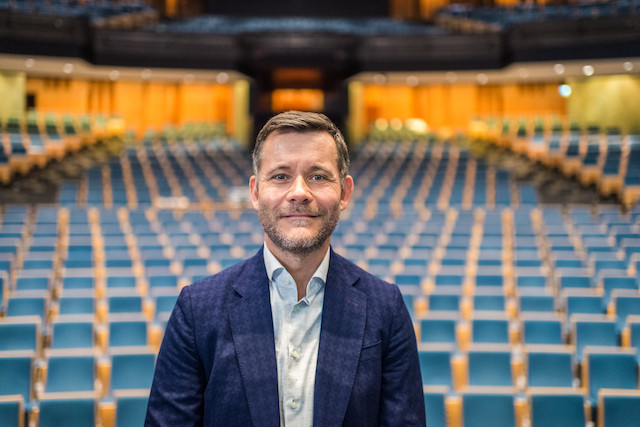An actor himself, Tom Leick-Burns says it was important when he was appointed to his role four years ago to send a message to the artistic community: “I see our responsibility very strongly in supporting the local artists.”
The artistic director of Les Théâtres de la Ville de Luxembourg adds that he wanted to “give space and time to artists to develop their own work”. And so the Talent Lab project began in the 2015/16 season, providing artists guidance in developing a performance. In addition, the Capucins Libre residency is “aimed at companies, independent collectives, who don’t have a space.” As the productions run in the official season, participants benefit from the “whole communication, PR [and technical] support from us, but artistically it’s really under their own steam.”
One “hell of a job”
The quality and scale of their self-produced work has evolved, says Leick, but so has international promotion. “We have more performances and we try, if possible, to find an international aspect of touring or partners [for] our own productions.”
Recent successes include Myriam Muller’s “Breaking the Waves”, which toured in Belgium and France and has been invited to Zagreb in September.
But there are challenges. “We really try to develop our identity as a producing house and establish that more firmly,” he says. Although the resources for their own productions has increased, “we’re still adjusting on an organisational level to the resources, skills we need, because it’s a hell of a job.”
Les Théâtres de la Ville de Luxembourg employs some 90-odd staff, including stage crew, plus freelancers depending on the project--a “small team”, taking into account the volume of work. This season was, for Leick, “an important moment, when I realised we’ve got it: the talent [and quality are] there, now we just, as an organisation, have to align ourselves”. A lot has happened over the last 10 years,” he adds, “…But it’s really our responsibility to have that added benefit and create those international opportunities for our artists.”
2019/20 season highlights
One highlight will be the festive season run of Bill Kenwright’s presentation of “Cabaret”. The show bring together “a starry cast…with Javier de Frutos’ choreography, it’s just one of those iconic pieces.”

The Grand Théâtre will transform in the sexually-charged, dark world of 1931 Weimar Berlin when Bill Kenwright presents "Cabaret", running end-December until 5 January. Photo: Pamela Raith
This season’s main English theatre production is “Dealing with Clair” by Martin Crimp anddirected by Luxembourg’s Anne Simon, whose “Stupid Fucking Bird” last season was acclaimed for its intelligence and humour. “Dealing with Clair” tackles themes such as the housing market and speculation, and asks profund moral questions. “What starts out as quite mundane turns into something quite dark, really something with Anne Simon’s usual sense of comedy, but also quirky.”
Also on the agenda: “Told By An Idiot”, the tale of how Charlie Chaplin and Stan Laurel met and worked in the music hall industry. “It’s very few words, but lots of slapstick, film footage, something for the whole family” Leick says.
Finally, “one of my favourite things I’ve seen in a long time”, says Leick, is “What If They Went to Moscow?”, in Portuguese with English surtitles. The audience sees the same piece twice: once as a theatrical performance, live-filmed and -edited, and projected into a separate space; and again as a film version. “I wouldn’t say it’s a completely different story in the film, but it’s obviously highly dependent on the point of view, camera angles,” says Leick. “When you see the theatre production, you really get this idea it’s participative…then you see the film version, and it’s really astounding.”
Dance, music and more
There’s something for everybody, promises Leick, in the dance season. The programme includes “Enter Achilles”, presented by Ballet Rambert & Sadler’s Wells, a work by Lloyd Newson of the landmark DV8 Physical Theatre company which “in the ‘90s did some groundbreaking work as far as physical theatre is concerned, really crossing boundaries between theatre, dance--very physical, in your face, tackling highly important issues in theatre”.

A behind-the-scenes look at set design: Les Théâtres de la Ville de Luxembourg employs some 90-odd staff, including stage crew, plus freelancers. Photo: Mike Zenari
Kate Prince and her ZooNation company bring a new project, “Message in a Bottle”, in which 20 performers dance to the music of Sting. Then there’s the ambitious return of the Michael Clark Company with a production that will have its world premiere at the Grand Théâtre.
Music highlights include Verdi’s adaptation of Shakespeare’s “Macbeth”; “Rusalka”, a co-production with the English National Opera; and “The Sleeping Thousand”, co-commissioned with the Festival d’Aix-en-Provence”. And, for those who enjoyed the fresh Luxembourg take on “Rumpelstiltzkin” two years ago, check out “Rabonzel” [“Rapunzel”]: “Gast Waltzing is composing the music, so it won’t be Rapunzel, the musical, but Rapunzel has a beautiful voice and that’s how it’s reimagined, that she wants to be a pop star,” says Leick. “Music will be a strong element in that.”
This article first appeared in the September/October print edition of Delano.
